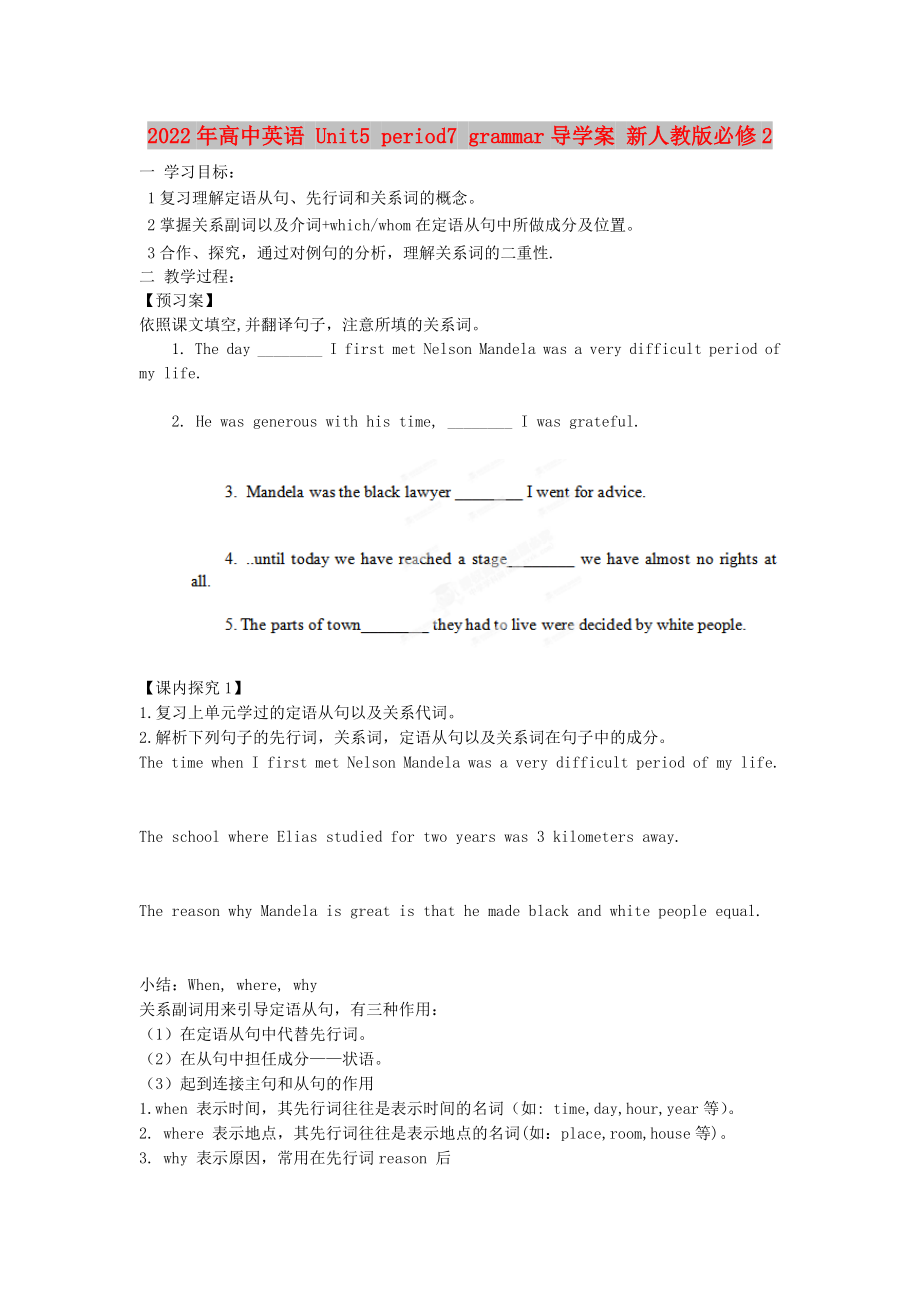《2022年高中英語 Unit5 period7 grammar導(dǎo)學(xué)案 新人教版必修2》由會(huì)員分享���,可在線閱讀����,更多相關(guān)《2022年高中英語 Unit5 period7 grammar導(dǎo)學(xué)案 新人教版必修2(3頁珍藏版)》請(qǐng)?jiān)谘b配圖網(wǎng)上搜索���。
1����、2022年高中英語 Unit5 period7 grammar導(dǎo)學(xué)案 新人教版必修2
一 學(xué)習(xí)目標(biāo):
1復(fù)習(xí)理解定語從句����、先行詞和關(guān)系詞的概念。
2掌握關(guān)系副詞以及介詞+which/whom在定語從句中所做成分及位置����。
3合作、探究�����,通過對(duì)例句的分析,理解關(guān)系詞的二重性.
二 教學(xué)過程:
【預(yù)習(xí)案】
依照課文填空,并翻譯句子����,注意所填的關(guān)系詞。
1. The day ________ I first met Nelson Mandela was a very difficult period of my life.
2. He was generous wit
2�����、h his time, ________ I was grateful.
【課內(nèi)探究1】
1.復(fù)習(xí)上單元學(xué)過的定語從句以及關(guān)系代詞���。
2.解析下列句子的先行詞��,關(guān)系詞����,定語從句以及關(guān)系詞在句子中的成分����。
The time when I first met Nelson Mandela was a very difficult period of my life.
The school where Elias studied for two years was 3 kilometers away.
The reason why Mandela is gre
3、at is that he made black and white people equal.
小結(jié):When, where, why
關(guān)系副詞用來引導(dǎo)定語從句��,有三種作用:
(1)在定語從句中代替先行詞。
(2)在從句中擔(dān)任成分——狀語�。
(3)起到連接主句和從句的作用
1.when 表示時(shí)間,其先行詞往往是表示時(shí)間的名詞(如: time,day,hour,year等)����。
2. where 表示地點(diǎn),其先行詞往往是表示地點(diǎn)的名詞(如:place,room,house等)���。
3. why 表示原因,常用在先行詞reason 后
【課內(nèi)探究2】
解析關(guān)系副詞wh
4���、en, where, why與 介詞+which的聯(lián)系
This was a time ________ you had got to have a passbook to live in Johannesburg .
Robben Island is the place______________ Mr Mandela once was kept.
The reason _________ Mandela is great is that he made black and white people equal.
小結(jié):關(guān)系副詞的用法
關(guān)系副詞
5���、 指代 在從句中的作用
when (=at/in/on /during which) 時(shí)間 時(shí)間狀語
where (=in/at which) 地點(diǎn) 地點(diǎn)狀語
why (=for which) 原因 原因狀語
相關(guān)探究:先行詞the way 做方式狀語時(shí)的引導(dǎo)詞:
I don’t know the way ______________ he solved the problem.
【深入探究】
介詞+關(guān)系代詞
“介詞+關(guān)系代詞”引導(dǎo)定語從句時(shí),介詞的賓語只能用which(
6�、指物)或whom(指人)
關(guān)系代詞前介詞的確定:
1.They’ll never forget July 1 ___________ Hong Kong returned to its motherland.
2.1992 is the year__________ you were born.
小結(jié):根據(jù)先行詞的習(xí)慣搭配
1.The school ________I was sent was very large.
2.Hong Kong is the city___________ he es.
小結(jié):根據(jù)定語從句中動(dòng)詞所需習(xí)慣搭配
Wu Song was
7、the man_________ the tiger was shot.
小結(jié):根據(jù)定語從句的意義
【小組探究】
用適當(dāng)?shù)慕樵~補(bǔ)充完整下列定語從句���。
1. I disagree with the facts ______ which your argument is based.
2. The song, ______ which he was interested, will never be heard again.
3. This is the reason ______ which he often es to school late.
4. I will never
8����、 forget the way ______ which my teacher taught me.
5. This is the hero ______ whom we are proud.
【課堂練習(xí)】
1. Is this the factory ____ he worked ten years ago? A. that B. where C. which D. the one
2. I shall never forget those years
9���、__ I live in the farm __ you visited last week. A. when; where B. which; which C. when; which D. which; where
3. Do you know the reason ___he was late?
A. for which B. for what C. which D. That
4. May the fourth is the day ____ we Chinese people will nev
10����、er forget. A. which B. when C. on which D. about which
5. Is that the reason ___ you are in favor of the proposal? A. which B. what C. why D. for that
【課后練習(xí)】
1.The reason ___ he didn’t pass the exam wa
11、s that he didn’t study hard.
A. which B. in which
C. for which D. of which
2.The school ___ my sister studies at is far from here.
A.where B. that C. at which D. in which
3.The days are gone forever ___ we used foreign oil.
A. when B. that C. which
12�、 D. at which
4.He was the only one of the boys who ___ late for school.
A. are B. were C. is D. was
5.He is the guest ___ the manager first introduced.
A.whose B. to whom C. who D. of whom
6.He made a hole in the wall___ he could get onto the house.
A. in which
13、 B. which
C. through which D. by which
7. After living in Paris for fifty years he returned to the small town ___ he grew up as a child.
A. which B. where C. that D. when
8.I can still remember the sitting room ___ my brother and I used to sit in the evening.
A. Of which B. which C. that D. where
9.We shall never forget the days ___ we worked together.
A. that B. in which C. on which D. which
10. I still remember the year ___ we spent together.
A. / B. when C. on which D. in which
 2022年高中英語 Unit5 period7 grammar導(dǎo)學(xué)案 新人教版必修2
2022年高中英語 Unit5 period7 grammar導(dǎo)學(xué)案 新人教版必修2

